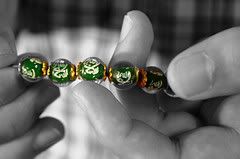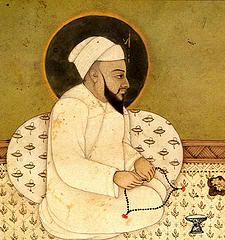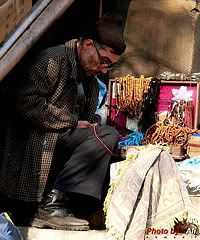 When I was little, I was secretly jealous of my catholic friends' rosaries. I guess Lutherans have rosaries too, and the ELCA apparently even has some prayers suggested for it, but it was never something that was part of my family's faith tradition, or even the traditions of the churches we went to. I can't really tell from the postings I've found, but it would seem that at least the ELCA rosary is a relatively new thing, which may explain why I never saw it in church.
When I was little, I was secretly jealous of my catholic friends' rosaries. I guess Lutherans have rosaries too, and the ELCA apparently even has some prayers suggested for it, but it was never something that was part of my family's faith tradition, or even the traditions of the churches we went to. I can't really tell from the postings I've found, but it would seem that at least the ELCA rosary is a relatively new thing, which may explain why I never saw it in church. When I began my spiritual journey in college, one of the first things I did was go out and buy a book on prayer beads that came with a string of 108 sandelwood beads. I flipped through the book and eagerly held the beads in my hand...and nothing. I didn't know what to say. The catholic rosary held no appeal to me. Nor did the buddhist mala. I had nearly lusted after beads my entire life, and when I had them in my hand, nothing.
When I began my spiritual journey in college, one of the first things I did was go out and buy a book on prayer beads that came with a string of 108 sandelwood beads. I flipped through the book and eagerly held the beads in my hand...and nothing. I didn't know what to say. The catholic rosary held no appeal to me. Nor did the buddhist mala. I had nearly lusted after beads my entire life, and when I had them in my hand, nothing.
 Now when I pick up one of my sets of prayer beads and let them slide through my fingers, my tongue knows what to do:
Now when I pick up one of my sets of prayer beads and let them slide through my fingers, my tongue knows what to do:سُبْحَانَ اللّهِ وَ بِحَمْدِهِ
SubhanAllahi wa biHamdihi
Glory be to Allah and I Praise Him
Glory be to Allah, All Praise is for Allah, There is No God but Allah, Allah is the Greatest, There is no might or any power Except with Allah
لا اِلهَ اِلَّا اللّهُ
La illaha ilAllah(u)
There is No God But Allah
This website has some excellent articles on dhikr that I refer to constantly. Unfortunately, geocities gives their sites limited bandwith, so if it doesn't load, try again later. It's well worth it.
For more indepth explanation of dhikr from a traditional sunni perspective, visit this page at sunnah.org.
Dhikr of Allah is the most excellent act of Allah's servants and is stressed over a hundred times in the Holy Qur'an. It is the most praiseworthy work to earn Allah's pleasure, the most effective weapon to overcome the enemy, and the most deserving of deeds in reward. It is the flag of Islam, the polish of hearts, the essence of the science of faith, the immunization against hypocrisy, the head of worship, and the key of all success.There are no restrictions on the modality, frequency, or timing of dhikr whatsoever. The restrictions on modality pertain to certain specific obligatory acts which are not the issue here, such as Salat. The Shari`a is clear and everyone knows what they have to do. Indeed, the Prophet said that the People of Paradise will only regret one thing: not having made enough dhikr in the world! Are not those who are making up reasons to discourage others from making dhikr afraid of Allah in
this tremendous matter?
Allah says in His holy Book: "O Believers, make abundant mention of ALLAH!" (33:41) And He mentions of His servants "Those who remember their Lord standing, and sitting, and lying on their sides" (3:191), in other words at all times of the day and night. He said (3:190-191): "The creation of heaven and arth and the changes of night and day are signs for people who have wisdom: -- consider who is described as having wisdom -- Those who remember (and recite and call) Allah standing up, sitting, and lying on their sides." `A'isha said, as narrated by Muslim, that the Prophet mentioned/remembered Allah at all times of the day and night.
The Prophet said: "If your hearts were always in the state that they are in during dhikr, the angels would come to see you to the point that they would greet you in the middle of the road." Muslim narrated it. Imam Nawawi in his Sharh sahih muslim commented on this hadith saying: "This kind of sight is shown to someone who persists in meditation (muraqaba), reflection (fikr), and anticipation (iqbal) of the next world."




No comments:
Post a Comment